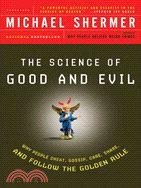The Science Of Good and Evil ─ Why People Cheat, Gossip, Care, Share, And Follow The Golden Rule
相關商品
商品簡介
作者簡介
商品簡介
From bestselling author Michael Shermer, an investigation of the evolution of morality that is "a paragon of popularized science and philosophy" The Sun (Baltimore)
A century and a half after Darwin first proposed an "evolutionary ethics," science has begun to tackle the roots of morality. Just as evolutionary biologists study why we are hungry (to motivate us to eat) or why sex is enjoyable (to motivate us to procreate), they are now searching for the very nature of humanity.
In The Science of Good and Evil, science historian Michael Shermer explores how humans evolved from social primates to moral primates; how and why morality motivates the human animal; and how the foundation of moral principles can be built upon empirical evidence.
Along the way he explains the implications of scientific findings for fate and free will, the existence of pure good and pure evil, and the development of early moral sentiments among the first humans. As he closes the divide between science and morality, Shermer draws on stories from the Yanamamö, infamously known as the "fierce people" of the tropical rain forest, to the Stanford studies on jailers' behavior in prisons. The Science of Good and Evil is ultimately a profound look at the moral animal, belief, and the scientific pursuit of truth.
Michael Shermer is the publisher of Skeptic magazine, the executive director of the Skeptics Society, a monthly columnist for Scientific American, and host of the Skeptics Lecture Series at the California Institute of Technology. His books include In Darwin's Shadow, The Borderlands of Science, Denying History, How We Believe and Why People Believe Weird Things. He lives in southern California.
We have long wrestled with questions of right and wrong, but one field of human endeavor—science—has traditionally sought to maintain a dispassionate distance from such controversies. And yet as evolutionary psychologists, biochemists, and anthropologists have begun to unravel the motives of the human animal, they have instigated a search into the roots of morality and the evolution of our complex ethical systems. Science, it turns out, has a lot to tell us about good and evil.
The psychologist and science historian Michael Shermer has written widely on the nature of belief, and The Science of Good and Evil is a provocative capstone to his work. In these pages, he explores an endlessly fascinating question: how and why did we make the leap from social primate to moral primate? As communities grew from bands and tribes to chiefdoms and states, Shermer explains, humans transformed the moral sentiments displayed in many primate species—shame and trust, for instance—into ethical principles. While gossip, shunning, and other informal methods might work effectively to curtail bad behavior in small groups, religion and formal ethical law worked better in large ones. Our morals and ethics, then, are products not of a divine source, but of our biological heritage and our cultural history.
Closing the artificial divide between morality and science, Shermer draws on a wide array of scientific evidence—ranging from the discovery of food sharing within vampire bat communities to the famous post-Holocaust psychological studies on obedience to authority and from recent anthropological fieldwork that proves our Paleolithic ancestors matched our modern propensity for warfare and ecological wreckage to research by neuroscientists on what is happening in the brain when we make moral decisions. He shows how game theory exposes the foundations of the Golden Rule, how chaos theory profoundly changes our perception of free will, and how fuzzy logic erodes the distinctions between good and evil. And he explores how science can help us address some of today's most difficult moral dilemmas—including debates over abortion, pornography, cloning, and animal rights.
Broad in scope, deep in analysis, and controversial to the core, Shermer's book shows how morality is deeply embedded in our being and behavior, and he develops a more universal, tolerant, and empirically based ethic that could serve all members of our species. 0The Science of Good and Evil is ultimately a profound look at the moral animal, the workings of belief, and the scientific pursuit of truth.
"This is an ambitious book, and it does not disappoint. The questions Shermer addresses are as old as rational thought, but they have taken on a new urgency as we come to understand ourselves through the sciences of mind, brain, genes, and evolution. His analyses are sophisticated and filled with good sense, and are enlivened with fascinating material from science and history. The Science of Good and Evil is an excellent snapshot of contemporary thinking about the nature and sources of morality."—Steven Pinker, Johnstone Professor of Psychology, Harvard University, and author of How the Mind Works and The Blank Slate
"Morality must have arisen long before modern religion came around to lay claim to it. Michael Shermer engagingly brings this controversial topic to life. This is the most convincing argument to date that the origin of our sense of right and wrong is to be found within us, that it is part and parcel of human nature."—Frans de Waal, author of Good Natured
"Michael Shermer's brain is a place where science, history, and psychology meet in the service of common sense. He uses his insatiable curiosity to penetrate the fog of fuzzy thinking, shedding light on the most controversial issues of science and society. Yet another courageous book."—K. C. Cole, author of Mind Over Matter and The Hole in the Universe
"There is no other volume on evolutionary ethics and its history that is as stimulating, critical, and comprehensive as Michael Shermer's. All of us are daily challenged by ethical dilemmas, and one's solutions are rarely satisfactory to everyone; this is particularly true if some of the solutions based on religion and philosophy. In the end, we must construct a Darwinian answer to the daily challenge of living a moral and ethical life. The best guide known to me is Shermer's profound analysis in The Science of Good and Evil."—Ernst Mayr, author of What Evolution Is
"Imagine there's no Heaven (as John Lennon suggested): what, then, is the foundation for morality? Skeptic magazine editor Shermer seeks to answer that question and to discover a scientific explanation for our notions of good and evil. He quotes Darwin to the effect that all scientific observation must be either for or against some point of view and avers his own viewpoint to be 'non-theistic agnosticism': the decision that, since God's existence is unprovable, he will live and act as if there is no God. The origins of morality and ethics, common to every society on Earth, must then lie in human institutions, Shermer concludes. Over hundreds of thousands of years, our ancestors arrived at moral principles designed to maintain peace and order in communities of ever-increasing size and complexity. The earliest 'moral' principles are those that many animals recognize, such as protecting one's mate or young. As human society grew, the needs of larger and larger groups became the basis of morality; at the center of many of them lies something like the Golden Rule, treating others as we would wish to be treated. At the same time, early superstitions coalesced into religions, each of which took on the role of sanctioning the moral principles of it
A century and a half after Darwin first proposed an "evolutionary ethics," science has begun to tackle the roots of morality. Just as evolutionary biologists study why we are hungry (to motivate us to eat) or why sex is enjoyable (to motivate us to procreate), they are now searching for the very nature of humanity.
In The Science of Good and Evil, science historian Michael Shermer explores how humans evolved from social primates to moral primates; how and why morality motivates the human animal; and how the foundation of moral principles can be built upon empirical evidence.
Along the way he explains the implications of scientific findings for fate and free will, the existence of pure good and pure evil, and the development of early moral sentiments among the first humans. As he closes the divide between science and morality, Shermer draws on stories from the Yanamamö, infamously known as the "fierce people" of the tropical rain forest, to the Stanford studies on jailers' behavior in prisons. The Science of Good and Evil is ultimately a profound look at the moral animal, belief, and the scientific pursuit of truth.
Michael Shermer is the publisher of Skeptic magazine, the executive director of the Skeptics Society, a monthly columnist for Scientific American, and host of the Skeptics Lecture Series at the California Institute of Technology. His books include In Darwin's Shadow, The Borderlands of Science, Denying History, How We Believe and Why People Believe Weird Things. He lives in southern California.
We have long wrestled with questions of right and wrong, but one field of human endeavor—science—has traditionally sought to maintain a dispassionate distance from such controversies. And yet as evolutionary psychologists, biochemists, and anthropologists have begun to unravel the motives of the human animal, they have instigated a search into the roots of morality and the evolution of our complex ethical systems. Science, it turns out, has a lot to tell us about good and evil.
The psychologist and science historian Michael Shermer has written widely on the nature of belief, and The Science of Good and Evil is a provocative capstone to his work. In these pages, he explores an endlessly fascinating question: how and why did we make the leap from social primate to moral primate? As communities grew from bands and tribes to chiefdoms and states, Shermer explains, humans transformed the moral sentiments displayed in many primate species—shame and trust, for instance—into ethical principles. While gossip, shunning, and other informal methods might work effectively to curtail bad behavior in small groups, religion and formal ethical law worked better in large ones. Our morals and ethics, then, are products not of a divine source, but of our biological heritage and our cultural history.
Closing the artificial divide between morality and science, Shermer draws on a wide array of scientific evidence—ranging from the discovery of food sharing within vampire bat communities to the famous post-Holocaust psychological studies on obedience to authority and from recent anthropological fieldwork that proves our Paleolithic ancestors matched our modern propensity for warfare and ecological wreckage to research by neuroscientists on what is happening in the brain when we make moral decisions. He shows how game theory exposes the foundations of the Golden Rule, how chaos theory profoundly changes our perception of free will, and how fuzzy logic erodes the distinctions between good and evil. And he explores how science can help us address some of today's most difficult moral dilemmas—including debates over abortion, pornography, cloning, and animal rights.
Broad in scope, deep in analysis, and controversial to the core, Shermer's book shows how morality is deeply embedded in our being and behavior, and he develops a more universal, tolerant, and empirically based ethic that could serve all members of our species. 0The Science of Good and Evil is ultimately a profound look at the moral animal, the workings of belief, and the scientific pursuit of truth.
"This is an ambitious book, and it does not disappoint. The questions Shermer addresses are as old as rational thought, but they have taken on a new urgency as we come to understand ourselves through the sciences of mind, brain, genes, and evolution. His analyses are sophisticated and filled with good sense, and are enlivened with fascinating material from science and history. The Science of Good and Evil is an excellent snapshot of contemporary thinking about the nature and sources of morality."—Steven Pinker, Johnstone Professor of Psychology, Harvard University, and author of How the Mind Works and The Blank Slate
"Morality must have arisen long before modern religion came around to lay claim to it. Michael Shermer engagingly brings this controversial topic to life. This is the most convincing argument to date that the origin of our sense of right and wrong is to be found within us, that it is part and parcel of human nature."—Frans de Waal, author of Good Natured
"Michael Shermer's brain is a place where science, history, and psychology meet in the service of common sense. He uses his insatiable curiosity to penetrate the fog of fuzzy thinking, shedding light on the most controversial issues of science and society. Yet another courageous book."—K. C. Cole, author of Mind Over Matter and The Hole in the Universe
"There is no other volume on evolutionary ethics and its history that is as stimulating, critical, and comprehensive as Michael Shermer's. All of us are daily challenged by ethical dilemmas, and one's solutions are rarely satisfactory to everyone; this is particularly true if some of the solutions based on religion and philosophy. In the end, we must construct a Darwinian answer to the daily challenge of living a moral and ethical life. The best guide known to me is Shermer's profound analysis in The Science of Good and Evil."—Ernst Mayr, author of What Evolution Is
"Imagine there's no Heaven (as John Lennon suggested): what, then, is the foundation for morality? Skeptic magazine editor Shermer seeks to answer that question and to discover a scientific explanation for our notions of good and evil. He quotes Darwin to the effect that all scientific observation must be either for or against some point of view and avers his own viewpoint to be 'non-theistic agnosticism': the decision that, since God's existence is unprovable, he will live and act as if there is no God. The origins of morality and ethics, common to every society on Earth, must then lie in human institutions, Shermer concludes. Over hundreds of thousands of years, our ancestors arrived at moral principles designed to maintain peace and order in communities of ever-increasing size and complexity. The earliest 'moral' principles are those that many animals recognize, such as protecting one's mate or young. As human society grew, the needs of larger and larger groups became the basis of morality; at the center of many of them lies something like the Golden Rule, treating others as we would wish to be treated. At the same time, early superstitions coalesced into religions, each of which took on the role of sanctioning the moral principles of it
作者簡介
Michael Shermer is the publisher of Skeptic magazine, the founder and director of the Skeptics Society, and a monthly columnist for Scientific American. He is the author of the bestselling Why People Believe Weird Things, How We Believe, and Science Friction, which will be published in January 2005 (see page 35). He lives in Los Angeles, California.
主題書展
更多主題書展
更多書展本週66折
您曾經瀏覽過的商品
購物須知
外文書商品之書封,為出版社提供之樣本。實際出貨商品,以出版社所提供之現有版本為主。部份書籍,因出版社供應狀況特殊,匯率將依實際狀況做調整。
無庫存之商品,在您完成訂單程序之後,將以空運的方式為你下單調貨。為了縮短等待的時間,建議您將外文書與其他商品分開下單,以獲得最快的取貨速度,平均調貨時間為1~2個月。
為了保護您的權益,「三民網路書店」提供會員七日商品鑑賞期(收到商品為起始日)。
若要辦理退貨,請在商品鑑賞期內寄回,且商品必須是全新狀態與完整包裝(商品、附件、發票、隨貨贈品等)否則恕不接受退貨。
























